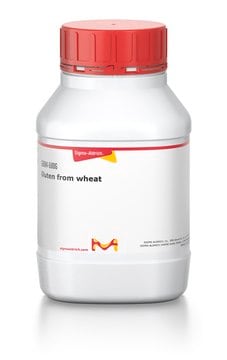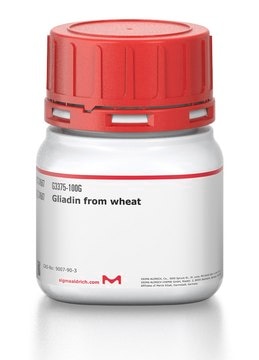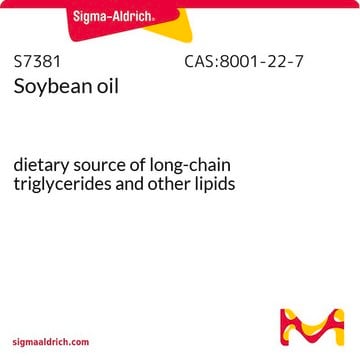S9633
Soybean flour
Type I
Synonym(s):
Soy flour, Soybean meal, Soybean protein powder
Sign Into View Organizational & Contract Pricing
All Photos(1)
About This Item
Recommended Products
biological source
Glycine max (soybean)
Quality Level
type
Type I
form
powder
composition
Protein, ~52% (85+% dispersible and 1% fat.)
application(s)
microbiology
Looking for similar products? Visit Product Comparison Guide
General description
Soybean flour is produced from the leguminous plant, soybean. It is a source of nine essential amino acids and has lesser carbohydrates and fat. Soybean flour is an excellent protein source. It is highly bioavailable and its isoflavone content prevents cardiovascular problems.
Application
A defatted, slowly available protein nutrient.
Soybean flour has been used:
- for optimizing Triton X-114 (TX-114) based lipopolysaccharide (LPS) extraction
- as a protein supplement in the in vitro fermentation of rumen fluid
- as a protein supplement in batch culture of bovine digesta to assess its degradation
Biochem/physiol Actions
Some studies have shown that soybean flour can be carcinogenic and induce pancreatic cancer in rats.
Preparation Note
Not roasted
Storage Class Code
11 - Combustible Solids
WGK
WGK 3
Flash Point(F)
Not applicable
Flash Point(C)
Not applicable
Personal Protective Equipment
dust mask type N95 (US), Eyeshields, Gloves
Choose from one of the most recent versions:
Certificates of Analysis (COA)
Lot/Batch Number
Don't see the Right Version?
If you require a particular version, you can look up a specific certificate by the Lot or Batch number.
Already Own This Product?
Find documentation for the products that you have recently purchased in the Document Library.
Customers Also Viewed
Helena Nevalainen et al.
Methods in molecular biology (Clifton, N.J.), 1096, 3-16 (2014-02-12)
Filamentous fungi are important organisms for basic discovery, industry, and human health. Their natural growth environments are extremely variable, a fact reflected by the numerous methods developed for their isolation and cultivation. Fungal culture in the laboratory is usually carried
Results of a screening programme to identify plants or plant extracts that inhibit ruminal protein degradation
Selje N, et al.
The British Journal of Nutrition, 98(1), 45-53 (2007)
Functional and edible uses of soy protein products
Singh P, et al.
Comprehensive Reviews in Food Science and Food Safety, 7(1), 14-28 (2008)
The fermentation of soybean meal by rumen microbes in vitro reveals different kinetic features for the inactivation and the degradation of trypsin inhibitor protein
Hoffmann EM, et al.
Anim. Feed Sci. Technol., 106(1-4), 189-197 (2003)
E E McGuinness et al.
Environmental health perspectives, 56, 205-212 (1984-06-01)
We have reviewed the growth-promoting and carcinogenic effects of feeding raw soya flour to rats. If the raw soya flour-containing diets are fed for more than a year, about 10% of the animals develop pancreatic cancer. In addition, feeding raw
Our team of scientists has experience in all areas of research including Life Science, Material Science, Chemical Synthesis, Chromatography, Analytical and many others.
Contact Technical Service









